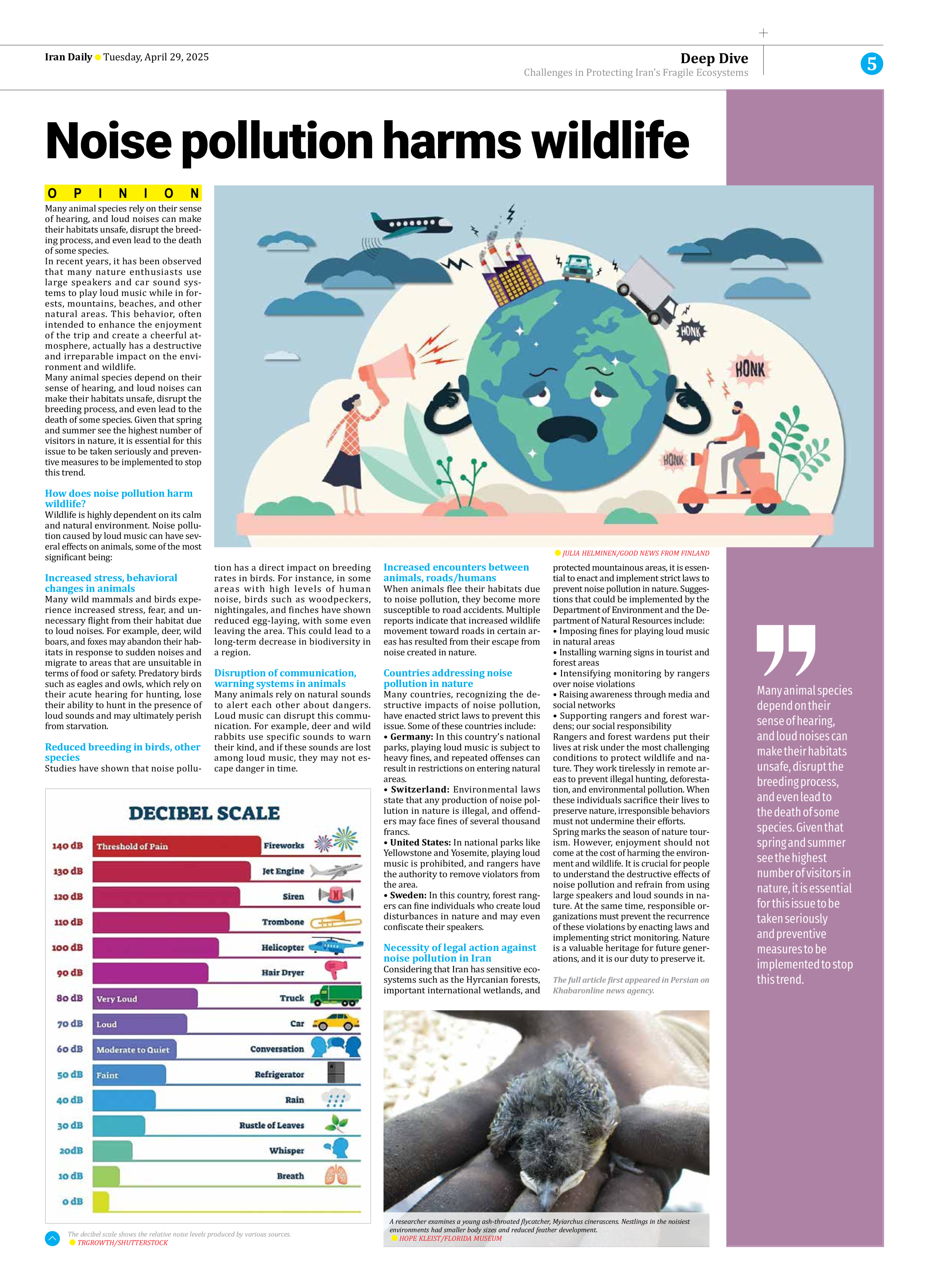
Noise pollution harms wildlife
Many animal species rely on their sense of hearing, and loud noises can make their habitats unsafe, disrupt the breeding process, and even lead to the death of some species.
In recent years, it has been observed that many nature enthusiasts use large speakers and car sound systems to play loud music while in forests, mountains, beaches, and other natural areas. This behavior, often intended to enhance the enjoyment of the trip and create a cheerful atmosphere, actually has a destructive and irreparable impact on the environment and wildlife.
Many animal species depend on their sense of hearing, and loud noises can make their habitats unsafe, disrupt the breeding process, and even lead to the death of some species. Given that spring and summer see the highest number of visitors in nature, it is essential for this issue to be taken seriously and preventive measures to be implemented to stop this trend.
How does noise pollution harm wildlife?
Wildlife is highly dependent on its calm and natural environment. Noise pollution caused by loud music can have several effects on animals, some of the most significant being:
Increased stress, behavioral changes in animals
Many wild mammals and birds experience increased stress, fear, and unnecessary flight from their habitat due to loud noises. For example, deer, wild boars, and foxes may abandon their habitats in response to sudden noises and migrate to areas that are unsuitable in terms of food or safety. Predatory birds such as eagles and owls, which rely on their acute hearing for hunting, lose their ability to hunt in the presence of loud sounds and may ultimately perish from starvation.
Reduced breeding in birds, other species
Studies have shown that noise pollution has a direct impact on breeding rates in birds. For instance, in some areas with high levels of human noise, birds such as woodpeckers, nightingales, and finches have shown reduced egg-laying, with some even leaving the area. This could lead to a long-term decrease in biodiversity in a region.
Disruption of communication, warning systems in animals
Many animals rely on natural sounds to alert each other about dangers. Loud music can disrupt this communication. For example, deer and wild rabbits use specific sounds to warn their kind, and if these sounds are lost among loud music, they may not escape danger in time.
Increased encounters between animals, roads/humans
When animals flee their habitats due to noise pollution, they become more susceptible to road accidents. Multiple reports indicate that increased wildlife movement toward roads in certain areas has resulted from their escape from noise created in nature.
Countries addressing noise pollution in nature
Many countries, recognizing the destructive impacts of noise pollution, have enacted strict laws to prevent this issue. Some of these countries include:
• Germany: In this country’s national parks, playing loud music is subject to heavy fines, and repeated offenses can result in restrictions on entering natural areas.
• Switzerland: Environmental laws state that any production of noise pollution in nature is illegal, and offenders may face fines of several thousand francs.
• United States: In national parks like Yellowstone and Yosemite, playing loud music is prohibited, and rangers have the authority to remove violators from the area.
• Sweden: In this country, forest rangers can fine individuals who create loud disturbances in nature and may even confiscate their speakers.
Necessity of legal action against noise pollution in Iran
Considering that Iran has sensitive ecosystems such as the Hyrcanian forests, important international wetlands, and protected mountainous areas, it is essential to enact and implement strict laws to prevent noise pollution in nature. Suggestions that could be implemented by the Department of Environment and the Department of Natural Resources include:
• Imposing fines for playing loud music in natural areas
• Installing warning signs in tourist and forest areas
• Intensifying monitoring by rangers over noise violations
• Raising awareness through media and social networks
• Supporting rangers and forest wardens; our social responsibility
Rangers and forest wardens put their lives at risk under the most challenging conditions to protect wildlife and nature. They work tirelessly in remote areas to prevent illegal hunting, deforestation, and environmental pollution. When these individuals sacrifice their lives to preserve nature, irresponsible behaviors must not undermine their efforts.
Spring marks the season of nature tourism. However, enjoyment should not come at the cost of harming the environment and wildlife. It is crucial for people to understand the destructive effects of noise pollution and refrain from using large speakers and loud sounds in nature. At the same time, responsible organizations must prevent the recurrence of these violations by enacting laws and implementing strict monitoring. Nature is a valuable heritage for future generations, and it is our duty to preserve it.
The full article first appeared in Persian on Khabaronline news agency.







